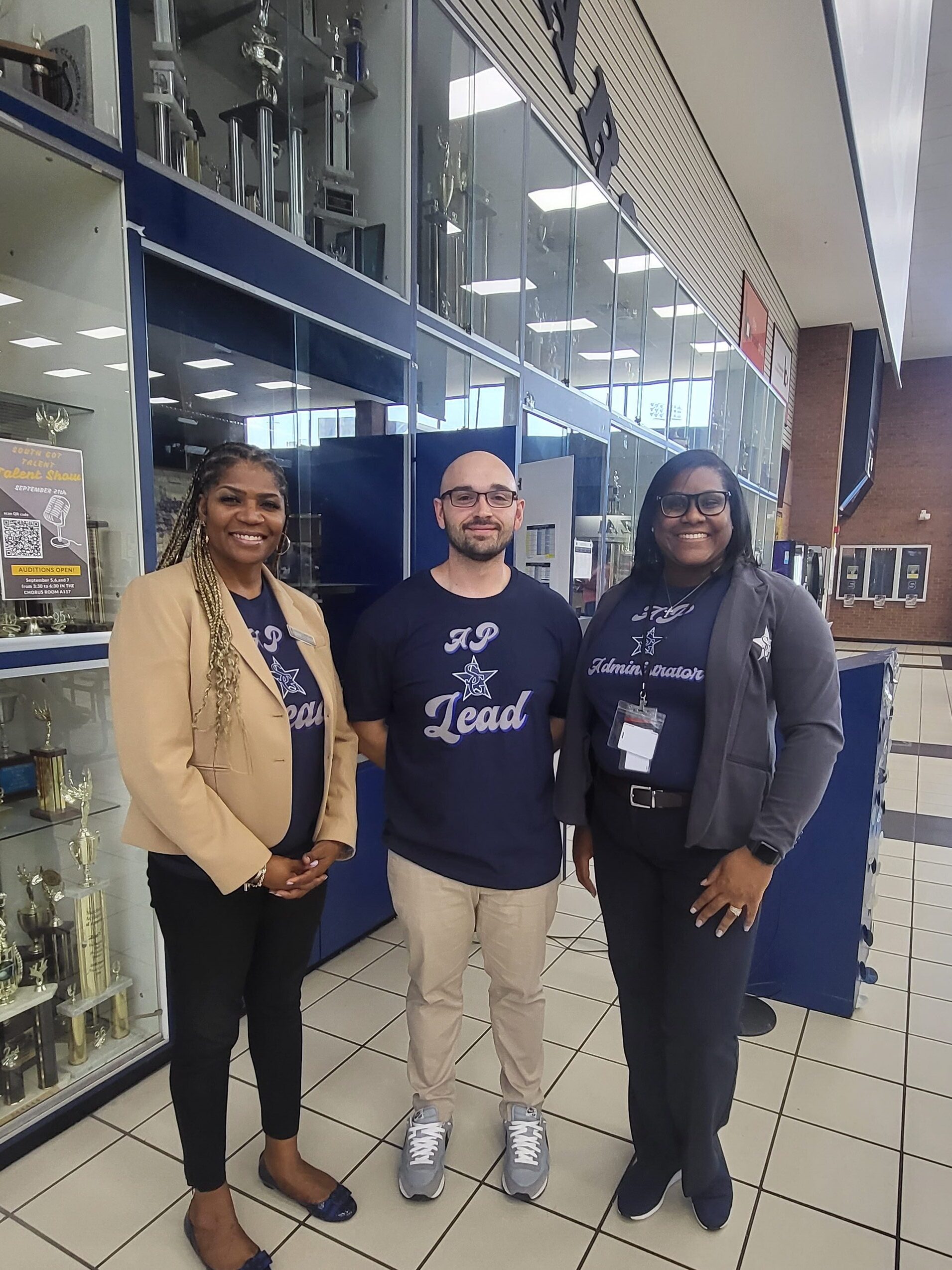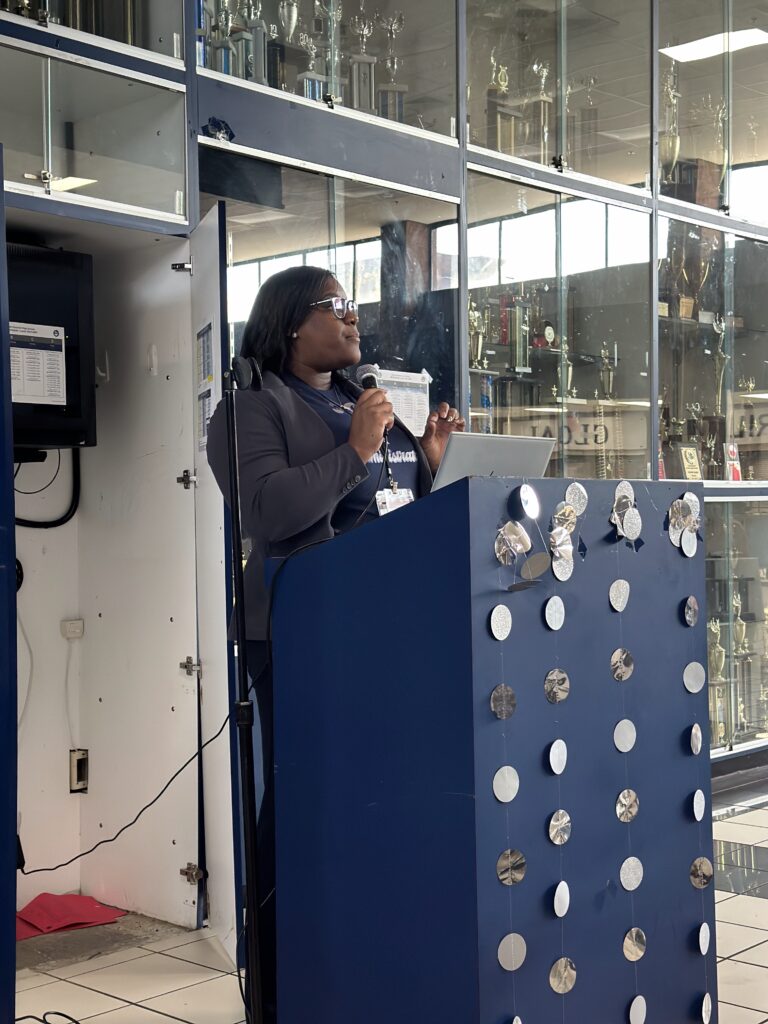Porsha Denson wears many hats at South Gwinnett High School in Georgia’s Gwinnett County Public Schools: Assistant Principal, AP/Gifted Coordinator, 12th Grade Administrator and Math Administrator.
Now, she can add EOS Opportunity Champion to her list of titles.
Denson is part of the inaugural class of Opportunity Champions, EOS partners recognized for doing exceptional work in transforming their district’s advanced academic pathways.

Denson was nominated by EOS partnership director Stephanie Sherer for her dedication and creative approaches to expanding access to advanced pathways for South Gwinnett’s students.
“Dr. Denson is a true advocate, working tirelessly to ensure that all students have the opportunity to pursue advanced opportunities in their areas of interest,” Sherer said. “She truly believes in fostering the unique abilities and skill sets of every student she serves.”
Denson is also a “passionate innovator,” Sherer added.
“In her first year, in a new building, she re-branded and re-marketed the AP program so that students feel a sense of pride and accomplishment participating in advanced opportunities. This strategy also serves to promote AP courses to potentially interested students.”
We asked Denson about the mission that drives her work, and the strategies her team employs to boost student enrollment and success in advanced courses. Read her responses below.
What drives you to continue working towards equal access and opportunity for your students?
My drive to continue the work of creating access and opportunity in my district is deeply rooted in my commitment to equity and my unwavering belief in the potential of every student. I am passionate about ensuring that all students — regardless of background, prior academic experiences, or perceived limitations — have the opportunity to engage in rigorous coursework and access the resources they need to succeed.
Seeing students thrive, build confidence, and compete on a national level because of the opportunities we create is incredibly rewarding. It reinforces the importance of breaking down barriers and fostering an inclusive academic environment where every student is encouraged to reach their full potential.
My favorite part of the work is leveraging real-time data from EOS surveys to drive meaningful change beyond just Advanced Placement courses. The ability to use up-to-date insights has allowed me to meet the needs of a broader range of students, ensuring that we are not only supporting AP students but also identifying and addressing gaps in other areas of the school. This data-driven approach has made it possible to respond quickly to student needs, inform decision-making, and implement targeted interventions that have an immediate impact. Knowing that these efforts lead to tangible improvements in student outcomes and overall school culture keeps me motivated and committed to this work.
How does your work with EOS impact your students?
EOS’ valuable data helps identify students who might otherwise go unnoticed in the advanced coursework pipeline. Data from the Student Insight Cards highlighted gaps in our AP enrollment, particularly among underrepresented students who had the potential to succeed in advanced coursework but were not enrolling.
Uplifting Teacher Voices to Prioritize Student Success

Recognizing that addressing these disparities required a collaborative approach, I prioritized incorporating teacher voice into decision-making.
During data review sessions, I engaged AP teachers in discussions about student potential beyond just numerical indicators. Teachers provided valuable insights into students’ skills, work ethic, and resilience — factors that data alone could not fully capture. Their input helped refine our approach to student recruitment, ensuring that we were not just relying on traditional measures but also considering qualitative aspects of student readiness.
As a result of these conversations, our AP recruitment strategies became more intentional. Teachers played a more active role in identifying and encouraging students who might have otherwise been overlooked. This led to an increase in students enrolling in AP courses, particularly from historically underrepresented groups. Moreover, teachers felt more empowered in the process, knowing their perspectives were valued in improving access to rigorous coursework.
Ultimately, the EOS work not only impacted our students by broadening their access to AP courses but also strengthened collaboration among educators. It reinforced the importance of shared decision-making and the power of data-informed, teacher-driven advocacy to support student success.
Empowering Students as Self-Advocates
One of the most significant impacts of EOS is that it empowers students to recognize their own academic potential. By gathering insights directly from students about their interests, confidence levels, and perceived barriers, the survey allows educators to have meaningful conversations with students who may have never envisioned themselves in higher-level courses. This targeted outreach has led to an increase in students advocating for themselves and expressing a desire to challenge themselves academically.
Overall, EOS has been a catalyst for change, fostering a culture of academic confidence and ambition while breaking down barriers to advanced learning opportunities.